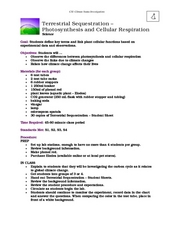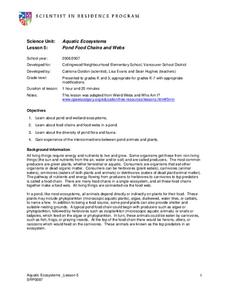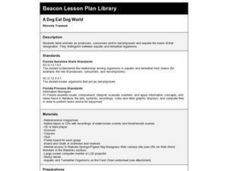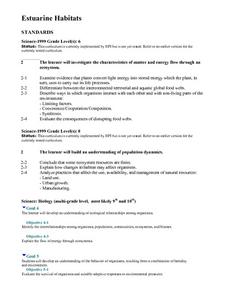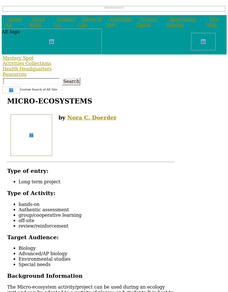Curated OER
WET Science Lesson #3: Comparison of Aquatic and Terrestrial Plants
Elementary life science explorers compare and contrast aquatic and terrestrial plants (elodea and soybeans) in a Venn diagram. Some background information is provided to support direct instruction, and general instructions are provided...
Curated OER
AMPHIBIAN RESPIRATION
Young scholars describe the structural differences in the respiratory systems of aquatic and terrestrial vertebrates and explain the motivation for these structural adaptations in reference to the differences in habitat.
Curated OER
Water and Land Ecosystems
Students investigate the differences between a land and aquatic ecosystem. They use the information in order to present it in an assessment. There are target questions that can be used to guide research, lead a classroom discussion, or...
Curated OER
Marine & Aquatic Habitats Activities - Terrestrial Forests vs. Kelp Forests
Students discuss concept and specificity of habitats, both marine and terrestrial, list similarities and differences in the habitats of a kelp forest and a terrestrial forest, compare types of organisms that occupy corresponding types of...
Curated OER
Terrestrial Sequestration - Photosynthesis and Cellular Respiration
Learners investigate how plants absorb carbon dioxide during photosynthesis. In this biology instructional activity, students differentiate photosynthesis and cellular respiration. They discuss the important role of plants in the...
Curated OER
Earth's Biomes
Tenth graders examine characteristics and animals of terrestrial biomes. In this Earth's biomes lesson plan, 10th graders view a PowerPoint, take noes, sort pictures, research biomes, and create a diorama of a biome for presentation.
Curated OER
Using Environmental Models to Determine the Effect of Acid Rain on an Ecosystem
Demonstrate to your middle school science learners how chalk breaks down in a weak acid. Discuss what affects acidic rain might have on ecosystems. Lab groups then choose one of two questions: "How does acid precipitation affect an...
Curated OER
Terrestrial Sequestration- Photosynthesis and Cellular Respiration
Students examine the differences between cellular respiration and photosynthesis. In this cellular processes instructional activity students complete a group lab activity to see how climate change affects their lives.
Curated OER
Habitat for Plants! There's No Place Like Home!
Learners compare and contrast conditions necessary for survival of aquatic and terrestrial plants, identify common and scientific names of plants,
and determine correlation between location and plant characteristics. Students then use...
Curated OER
Aquatic Ecosystems
Students study ponds and wetland ecosystems and examine the food chains and webs in them. In this aquatic ecosystems lesson students answer questions about the diversity of the flora and fauna in a pond.
Curated OER
Amphibian Features - Frog Dissection
Seventh graders examine the physical features of an amphibian. In this investigative lesson students compare and contrast the anatomy of a frog to a human.
Curated OER
The Wonderful World of Slugs
Examine a slug? Of course, what else would a 2nd grader do with it? Pupils use clues and go on a slug hunt, read a slug story, or make a cooperative group mural of a slug's habitat. While older learners catalog slugs, go on a slug hunt,...
Curated OER
Trophic Pyramids and Levels
The bulk of this lesson involves the construction of both an aquatic and a terrestrial ecosystem in which to observe trophic relationships. Detailed directions are provided, as well as discussion questions, and assessment activities....
Curated OER
A Dog Eat Dog World
Fourth graders distinguish between acquatic and terrestrial organisms. They label animals as producers, consumers, and/or decomposers.
Curated OER
Identifying Biomes
Students compare the differences between the different terrestrial and aquatic biomes. They discuss the characteristics of each biome. Students are asked what biome they live in. They are asked what is the biome located on land called?...
Curated OER
Mouthwatering Mollusks
Students investigate various forms of aquatic life. They use four senses, touch, taste, smell, and observation to explore mollusks. Students cook and taste various types mollusks, such as mussels, scallops, and squid.
Alabama Learning Exchange
Biomes
Pupils research different biomes and find its climate and what plants and animals that can be found in them. For this biomes lesson students search the Internet for their information and fill out a biome chart.
Curated OER
Dissolved Oxygen Lesson
Students investigate what dissolved oxygen is and why it is important to aquatic life and what factors influence levels of dissolved oxygen in a lake. They study how to use MS Excel to make charts to show trends and correlations.
Curated OER
Estuarine Habitats
Sixth graders study the important habitats, flora, fauna, and physical factors of coastal habitats. They compare the aquatic habitats to terrestrial habitats by researching and completing tables with the information.
Curated OER
Worms Crawl In and Do Lots of Things
High schoolers observe the aquatic segmented worm, Lumbriculus varigatus and the life processes. They explore the processes of nutririon, transport, regulation, locomotion, and removal of wastes.
Curated OER
What A Tangled Web We Weave
Learners of many ages discuss how all organisms rely on other organisms for their survival. They construct a food web and energy pyramids, and write an informative essay about the food web that they have designed.
Curated OER
Study of Animals
Third graders use the internet to research about an animal. After watching a demonstration, they follow the same steps to gain access to the internet as their teacher and find a picture of their animal to print. They complete a worksheet...
Aiken County Public Schools
Claymation in the Classroom
Students design an appropriate and usable storyboard and then create a claymation video. They take digital photographs frame by frame, then assemble the stop-motion movie using video software.
Curated OER
Micro-Ecosystems
Students create a sustainable, self-contained ecosystem in a ten-gallon aquarium.









